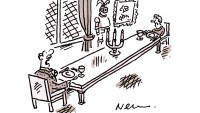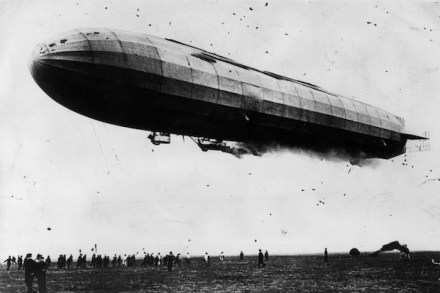Jamie
Jamie Oliver Twist

Jamie Oliver Twist

‘Of course I’m not leaving you — these are your bags I’m packing.’

‘We try to engage young minds by providing things toddlers genuinely want to play with.’


'It's not the most exciting bucket list, darling.'



‘I’ll get the butler to watch Downton Abbey for us.’


‘I think you’re being briefed against.’

Never say never Sir: Dot Wordsworth (Mind your language, 20 September) quotes various telling usages of ‘never’ for rhetorical or theatrical effect. But she missed one of the earliest and spine-chilling best: the Declaration of Arbroath of 1320. Quite apart from including the first-known written statement of the old Scottish principle that kingship is essentially
Pot plants A 65-year-old Devon woman rang a BBC gardening show to enquire about a mystery plant only to be told it was a cannabis plant. Some other places cannabis plants have been found: — In 2012/13 British Transport Police found 500 plants growing across the rail network, including one at Hounslow station. — Under lights in the boiler room


Home David Cameron, the Prime Minister, visited New York for talks at the United Nations; he said Britain supported the American air strikes on the Islamic State. ‘These people want to kill us,’ Mr Cameron said on NBC news. Mr Cameron met President Hassan Rouhani of Iran in New York, the first such meeting since the Iranian

It is a mark of the uncertainty of our policy in the Middle East that just over a year ago Parliament was recalled to debate whether to launch military strikes in aid of rebels in Syria. This year, it has been recalled to discuss whether the RAF should join the strikes against the rebels in


From The Spectator, 26 September 1914: There is nothing that a soldier needs more than good footwear; he can fight if need be on an empty stomach, but he cannot march on bare feet. Still, the means of supplying his needs are circumscribed. A commanding officer can make arrangements for accepting cartloads of goods at

How will Cameron be remembered in years to come? As a steady-as-she-goes pragmatist or a radical reformer? In actual fact, he’s both. No modern Tory leader has been so good at looking calm under fire, yet there is a more radical Cameron. The insouciance is partly an act. In this week’s podcast, Freddy Gray, Fraser Nelson
From The Spectator, 26 September 1914: Excellent use is made of captured documents, and we are treated to excerpts from a letter by a German private which deals with the fighting capacity of the British soldier:— “With the English troops we have great difficulties. They have a queer way of causing losses to the enemy.

This afternoon Ed Miliband gave his last speech to the Labour conference before the general election. There’s full text and audio, and here’s the analysis from the Coffee House team: listen to ‘Ed Miliband’s speech: podcast special’ on audioBoom


From The Spectator, 26 September 1914: The early afternoon papers of Friday publish a Reuter telegram to the effect that a Zeppelin flew over Ostend at eleven o’clock on Thursday evening, dropped three bombs, and flew away again. The damage was one office wrecked and one dog killed. If that is the bag of one Zeppelin
From The Spectator, 26 September 1914: On Thursday the Press Bureau issued a very striking descriptive account of the situation at the front, written by “an eyewitness present with General Headquarters.” It supplements the spirited narrative issued in the earlier part of the week, and shows that under pressure the War Office has discovered a very efficient
